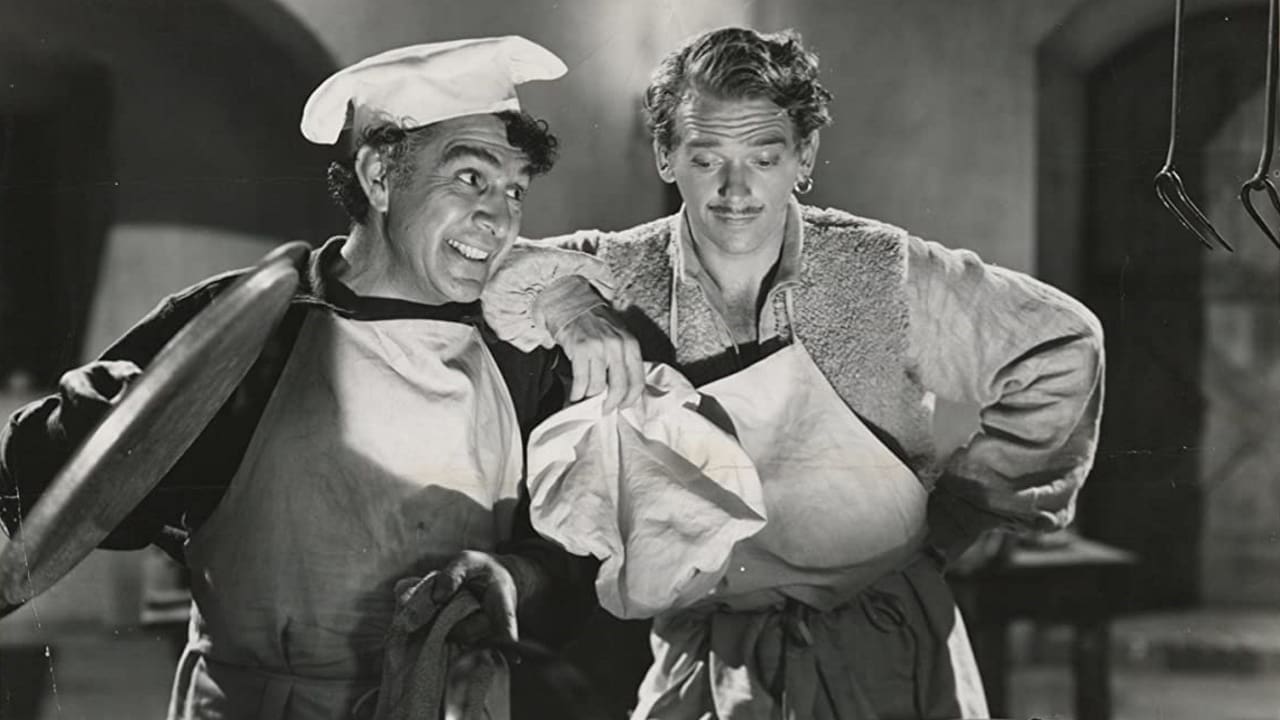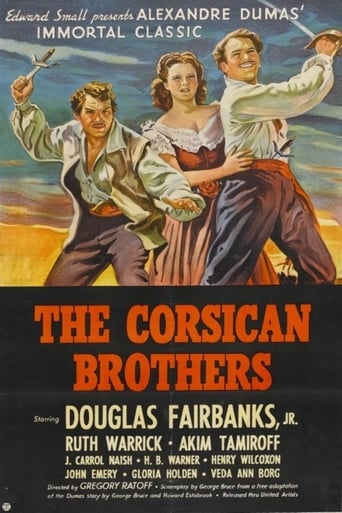



just watch it!
A Major Disappointment
It's a good bad... and worth a popcorn matinée. While it's easy to lament what could have been...
View MoreA clunky actioner with a handful of cool moments.
It always amazes me that some critics will give a movie a rave review and then reward it with a score of seven out of ten. When I went to school, seven was the lowest mark you could achieve without being punished. It is not a good mark at all. But I would give this movie only five. Despite good acting and pleasing photography, it's something of a bore - thanks mostly to Gregory Ratoff's plodding direction of an equally uninspired script by George Bruce that was worked up by Bruce himself and Howard Estabrook from the once-very-popular Dumas novel. Drastic cutting would have helped considerably, but neither the supervising editor, Grant Whytock, nor his offsider, William Claxton, took that measure. A disappointingly banal music score by Dimitri Tiomkin doesn't help either.
View MoreThe Corsican Brothers" is a 1941 black and white adventure films from the Alexander Dumas novel (1844) of the same name. It was the 8th adaptation of the book to film, and would continue to be adapted including "Cheech and Chong's The Corsican Brothers" (1984) and "Start the Revolution without Me" (1970). This is probably the best of the serious adaptations, but that's not saying much. The acting, photography, and music are all very ordinary, with nothing noteworthy to remark on. The special effects (using Fairbanks as his own brother) are relatively poor, even given the date of the film.If you like films about France in the pre-industrial age, my favorites are Marat/Sade (1967), Napoleon (1927), A Tale of Two Cities (1935), The Count of Monte Cristo (1934) and The Three Musketeers (1921, 1935).
View MoreI'm glad I had a chance to see "The Corsican Brothers" on TCM. It was exciting, exotic, romantic, and, best of all, from my point of view, based on a classic.In the opening credits, it's stated that the film has been "freely adapted," or, in other words, loosely adapted, from the original Dumas novella. Here's what is similar and different between the two versions. Both film and novella feature Siamese twins, surgically separated, with one living in Paris, the other in the Corsican hills, and thereafter able to sense each other's feelings with a kind of ESP. In both, the Parisian twin learns of a bet between two gentlemen to connive (or force, in the original) a date with a beautiful lady, and the Parisian gallantly intervenes only to be injured. Of course, his twin living back in Corsica in both cases is able to sense the injury. This is the center of the original Dumas story, and all of this is in the movie as well.The film, though, in order to fill out a full-length feature, adds a great deal to this original plot. In the film, it is imagined that the reason for the original separation of the twins is related to a massacre of the twins' parents and family which is part of a larger family feud (this is Corsica, after all). When the twins become of age, they take up this feud as personal vendetta and begin killing the members of the other family, using their identical appearance as a method of trickery. The romance between Louis and the beautiful lady (here a countess) is also elaborated, and, to complicate matters, both twins both fall in love with her and wind up quarreling. All of this additional material I found diverting and, actually, probably necessary, since the original source was thin.Although there is much to praise about the movie, I'll mention one aspect I didn't personally like. In order to create two entirely different personalities who look identical but are of separate character types, Fairbanks makes Lucien, who lives in the Corsican hills, surly and sullen—not very likable. As for the Parisian Louis, Fairbanks makes him foppishly verbose—also not very likable. This wasn't part of the original story, where both brothers were appealing, intelligent, and well bred even while being different.I agree with the other commenter, by the way, that "Start the Revolution Without Me" based on the same conceit and probably the same source, where Donald Sutherland's foppishness is magnified to extreme lengths, is hilariously entertaining.
View MoreI saw the movie as a youngster and many times again as an adult. It was Great. Douglas Fairbanks Jr. played well in both roles as the twin brothers. Ruth Warrick was absolutely gorgeous as Countess Gravini. Akim Tamiroff was perfect as Baron Colonna and John Emery as his Cousin,Tomasso. J. Carrol Naish was wonderful as always as the caretaker of Brother Lucien, the almost bad brother. The old time actor H.B. Warner was excellent as the doctor who separates the twins at birth, and takes care of them as adults. The action was good and comical at times. The ending sword play was just fine and ended in a good conclusion. I highly recommend this movie.
View More